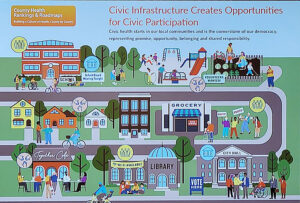By Jondi Gumz
On March 29, Pajaro Valley Unified School District, Applied Survey Research, Santa Cruz County Health Services Agency and Pajaro Valley Prevention and Student Assistance gathered at the PVUSD Wellness Center to release and discuss the 2023 County Health Rankings National Findings Report.
The ranking system, which came out more than 10 years ago, gives a way to compare Santa Cruz County to other counties in the state and in the nation.
This year, there is a new focus on civic participation and how it relates to wellbeing.
There’s still a lot of imbalance in power and access, said Monica Morales, director of the Santa Cruz County Health Agency, who grew up locally.

“We continue to challenge institutions that they’re meeting the needs of our community,” Morales said. “We need to be at the table listening and actually being part of the solution.”
The data show improvements but more work must be done, she said.
Susan Brutschy of Applied Survey Research said the county’s teen birth rates are much lower than statewide, for example, and only 6% of babies had low birth weight compared to 7% in the state and 8% nationwide.
Severe housing problems affect 26% in Santa Cruz County compared to 17% for the nation.
What the rankings do not provide is a way to dig into the disparities between North County and South County but that is something the Health Services Agency staff is trying to do using data on income, employment and insurance levels.
Jasmine Najera, CEO of PVPSA, recalled when Morales was in a Summer Youth Employment program, which she said shows the power of mentorship.
The issue around behavorial health is skyrocketing, Najera said, citing trauma brought on by the pandemic, wildfires, gun violence, and most recently flooding.
“The good news is people are asking for services,” she said.
Her agency provides school-based counseling services to Pajaro Valley Unified schools.
But there aren’t enough clinicians to provide those services, and the people in those professions are burnt out.
Over the years, PVPSA has supervised and mentored about 300 master’s level clinicians, many of whom have gone to work at Pajaro Valley schools and county Behaviorial Health and other sites.
“We’re actually doing really well in the county (which ranked 9th in the state) compared to the rest of the counties,” said Dr. Rodriguez, who came to Pajaro Valley seven years ago and still sees disparities.
She said “85% of our students are living in poverty,” which is a far larger percentage than exists countywide.
And 14% of Pajaro Valley students were without permanent housing before the flooding, she pointed out.
One of her strategies is community partner organizations that interact with students, 89 such partners at the last count.
Another strategy is listening to people in the community and allow them to “co-design” the solutions.
Hearing the need, Rodriguez opened the Family Wellness Center in Watsonville to create a resource for families when most schools close for winter break for three weeks.
Since that center opened in December 2021, she said, 14,800 families have walked through the doors — and 7,980 families have come to get food.
Hours are 11 a.m. to 7 p.m. Tuesday through Friday, and Saturdays from 9 a.m.to 4 p.m. Students assist and committed more than 300 community service hours.
“We didn’t stop listening,” Rodriguez added. “We provided frozen meals through Martha’s Kitchen.”
That was in response to people who said they could not cook with eggs or milk because they do not have a kitchen with appliances, they are living in their car, or renting a room with a microwave or a hot plate.
Since the flooding, the number of frozen meals provided has gone from 150 a week to over 600 a week, Rodriguez said.
Another partner is Triple P, to help parents cope with behavior issues of their children, and Empower Watsonville, a group for young people to speak up for change.
It’s not just about wraparound services, it’s about empowering teens to reimagine and rebuild systems, which haven’t been working for many of the Pajaro Valley students.
“We have 95% of our Pajaro students back in school,” Rodriguez said. “Families are telling me I want my child back in normalcy.”
The state Legislature in 2017 passed a bill to recognize students for participation and understanding of the U.S Constitution, state constitution and the democratic form of government. High school students can earn a civic seal on their diploma.
Pajaro Valley is one of the nine school districts that is an early adopter of this program.
A requirement is for students to be involved in one or more civic engagement projects, “inquire into civic needs or problems, consider varied responses, take action and reflect on efforts.”
•••
See the rankings at www.countyhealthrankings.org/?&utm_source=google&utm_medium=paidsocial&utm_campaign=rankings2023
Here is a link to the recording of the live streamed event: www.youtube.com/watch?v=ju4rnwcEyhY